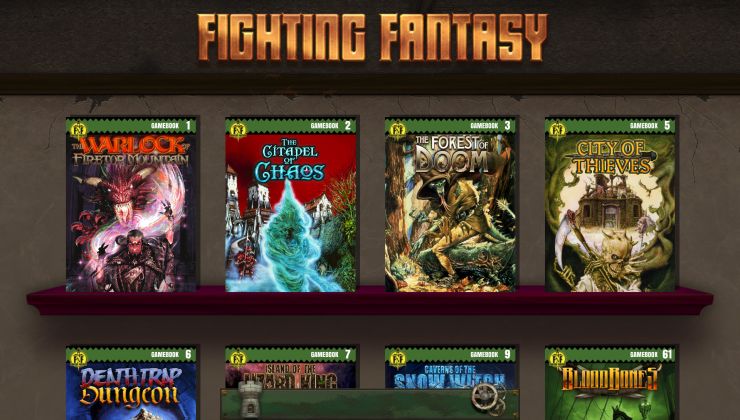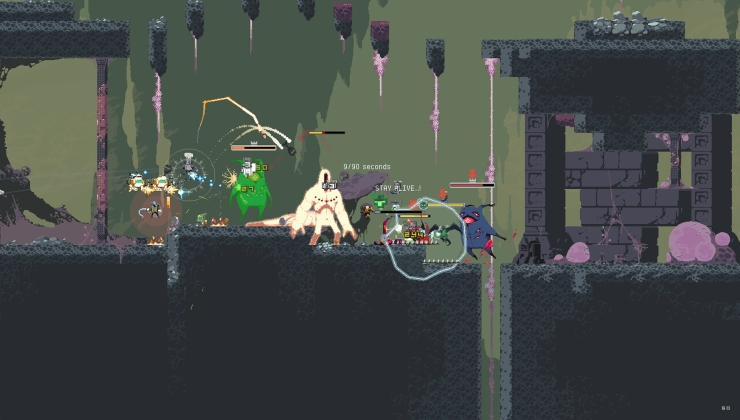Valve and game developers have a bit of a fight on their hands here, with a French court ruling that Valve should allow users to re-sell their digital games.
Reported by the French website Next Inpact, the French consumers group UFC Que Choisir had a victory against Valve as French courts have ruled against them on the topic of reselling digital content. From what I've read and tried to understand, the courts have basically said that when you buy something on Steam it is indeed a proper purchase and not a subscription.
Valve has been ordered to pay damages at €20K plus €10K to cover some costs. On top of that, they will also have to publish the judgement on Steam's home page (presumably only for users in France) and for it to remain visible for three months. If they don't, they will get a fine for each day of €3K. To Valve though, that's likely pocket change. The bigger issue though, is how other countries inside and outside the EU could follow it.
Speaking to PC Gamer who got a statement from Valve, they are going to fight it. Of course they will though, they could stand to lose quite a lot here and it would set a pretty huge precedent for other stores like GOG, Epic, Humble, itch and all the rest.
There's a lot to think about with this situation. Valve could end up changing the way they deal with this, just like they did with the nicer refunds option which came about after legal issues too. Imagine being able to sell and transfer a game over to another Steam user. Valve could take a cut of that most likely too.
Something to think on there is how this could affect game developers too, I'm all for consumer rights but I do try to think about all angles. We could end up looking at higher prices overall, no release day discounts, more micro transactions, more games updated as a constant service, games that require an online account as a service so you're not paying for an actual product and so on as developers try to keep more income when many smaller developers are already struggling.
Interesting times.
Hat tip to Nibelheim.
https://cdn2.nextinpact.com/medias/16-01008-ufc-que-choisir-c--valve.pdf
Valve and developers will be more profitable to abandon the entire French marketFrance is like their 7th market, how this could be more profitable?
I see many devs including Ubisoft leaving France, losing hundreds of jobs just because people want to resell a game they get for 15$ for 5$ bucks.
If a second hand market would crash a business, we will not even have cars... There are many reasons to leave France as a company, like taxes, strong social laws, etc., so just don't say anything you don't know about.
This will hurt everyone.Too many arguments I don't know what to say...
Nedless to say that releasing an untested and badly optimized game would quickly become a suicidal move and nobody would do it.
How horrible.
:) My domain is in the digital markets. I know that free digital markets are more efficient. For a fact. So I'm not saying that the idea is necessarily nuts. It's just that for us customers it would require active interest to get the most out of it. Much more than now. And the average Joe doesn't have the resources to do it. So one would need to rely on broker services to effectively find good key keys at reasonable convenience. A G2A on steroids. Soon to appear brokers would find business opportunities and make the market more efficient in the process (my Borderlands 3 scenario is about this, efficiency mechanics would devaluate licenses of low quality games). So far so good. But markets can (and will be) manipulated if someone has enough resources to do it (spoiler: there is always somebody with enough resources). So you will also need regulation and authorities preventing shady stuff.
Like *exclusives* undermining market efficiency. They already do but it would be significantly worse in a free market. Also the markets need to compete with each other. But the real challenge is how to regulate first sale publishers. Digital copies are not like physical ones. Selling an additional digital copy costs you nothing and second hand licenses do not deteriorate over time also. They don't occupy space and don't have logistics costs. Publishers can produce or not produce them at will. Publishers would also be able to buy back their own copies to keep prices higher. Should this be illegal? After all licenses would become no different than any other financial asset. But publishers will do inside trading by definition, they know about patches, DLCs, free updates and future plans. They would speculate for sure if they can. And if they are prevented to do it by themselves they could delegate others. Or sell reserved information to traders for profit. Maybe not as companies but as individuals. Who controls that? At what cost? Really, you can't possibly hope to regulate digital goods with the same principles and common wit you use for physical goods. They just don't apply.
This matter if left alone could become so complex and so exploitable so fast that it could take very long time until a reasonable and functional balance is found. And in the meanwhile: chaos. Not that balance cannot be found. It's just not so obvious as one might think at first glance. And usually in this kind of competition the guy with the less resources is the guy who loses.
But maybe it's just me being biased and overthinking everything. The actual rule could have much less implications than this like just allowing one and only one resell per license. Or it could just convince french legislators to make specific laws for digital goods. And I do believe things can improve in this regard. Especially on exclusives and geoblocking, laws are to hard on piracy and to permissive to content distributors (for instance: why should be illegal to download something that is not sold or not easily found in my country and that I cannot buy from foreign digital services?). Though usually in the EU is more about transferring profits from US firms to EU ones rather than making the actual citizen interest. However I keep my idea that just empowering people to buy and sell licenses at will is not a good idea without serious rules, limits and watchers in place. And that stuff has a cost. Is it really worth it?
This whole "license" thing is messed up. What you are buying are files. Something that contains digital goods. Attempts to frame it as "licensing" are just dumb methods to reduce user's rights.One could argue that you can’t actually sell files. What you have on your drive, whether you got it from Steam or a second-hand reseller, is a copy of the seller’s files. And you can’t resell your files for the same reason. You can destroy them, but you can’t hand them over short of parting with the actual medium they’re on. You can accept money to send a copy and then choose to delete your own, but the actual files never change hands. It’s just data on a medium and that data doesn’t actually move through the sale. That’s why the only perspective that makes sense to me is selling rights/licenses to do certain things with that data and its copies; namely to execute, copy, redistribute, etc.
As you pointed out yourself, you wouldn’t be buying used goods by any definition. In the case of Steam, you would be getting a fresh new license to access certain content via Steam, and the reseller would have their license removed, but could easily keep the actual software on their system and if it’s not DRM-protected, keep using it.
If this became law, I can only imagine the entire industry shifting to a Stadia-like approach where the distributors make it very clear that you’re only renting access to a stream that you can influence to some extent (via controller input during gameplay and via payment for specific content [games] being streamed to you), not any sort of tangible product. As others have said, that sounds like the ultimate DRM.
This will be an interesting change. It really benefits DRM free stores like GOG - their users already could sell the game if they wanted(breaking the law in a hard to detect fashion), but usually didn't. Some publishers will definitely try to dodge the problems by going into microtransations, where the game is free, but the money is in small items tied to the account, although if this ruling stands, in game item trading might be next.
Reselling a GOG is probably the most unmoral thing you can do if you care about GOG.
I really doubt that this benefits GOG in anyway as they, as Steam, will be forced to create a community market where users are allowed to resell their copies and the business model of GOG will get definitely hit if people starts abusing of the system (and abusing of GOG model is far more easier than abusing of Steam model).
Last edited by x_wing on 20 Sep 2019 at 12:08 am UTC
One could argue that you can’t actually sell files. What you have on your drive, whether you got it from Steam or a second-hand reseller, is a copy of the seller’s files. And you can’t resell your files for the same reason.
That's moot. Printed book is also called a copy, except it's a physical one. What defines the right to resell is this first sale doctrine idea. In theory it's not wrong. You should be able to sell what you bought. Trying to restrict that is wrong. The problem is the nature of digital goods. As I said before, if that market can function well, such different nature shouldn't be a blocker for reselling. But if it can't - it's a problem. I wouldn't try to make a prediction how well it could work. It's hard to tell.
Last edited by Shmerl on 20 Sep 2019 at 12:09 am UTC
They’re just quoting the Steam terms of use.If someone interested, there is the full court ruling available here : (in french ofc) :
https://cdn2.nextinpact.com/medias/16-01008-ufc-que-choisir-c--valve.pdf
I wish I knew french the ruling seems pretty extensive. There are a bunch of pages that talk about Cheats.. woot that would be really surprising! a judge ruling about cheats and exploits on fortnite :P
oh my... I saw so stupid comments I don't know where to start...
Valve and developers will be more profitable to abandon the entire French marketFrance is like their 7th market, how this could be more profitable?
I see many devs including Ubisoft leaving France, losing hundreds of jobs just because people want to resell a game they get for 15$ for 5$ bucks.
If a second hand market would crash a business, we will not even have cars... There are many reasons to leave France as a company, like taxes, strong social laws, etc., so just don't say anything you don't know about.
This will hurt everyone.Too many arguments I don't know what to say...
There is a difference between second hand cars and second hand software: Cars tend to catch scratches. Second hand games are indistinguishable from new games.
There is another one: There are no DRM free cars that you can simply keep when you sell them.
Second hand cars do not need servers. Games will have to be detached from accounts, to be able to sell them. So Valve could simply charge a percentage fee for detaching keys. I on their side wouldn't help to sell the keys, just detach and deliver them.
Developers still won't like the idea. They will sell less copies. Lifting prices would make second hand games even more attractive, but would also lift the detachment fee.
So yes, I think one result would definitely be higher prices for games.
Precisely. Whether it’s a copy or an original, you have to part with a book to sell it, which is not the case with digital files; thus the can of worms.One could argue that you can’t actually sell files. What you have on your drive, whether you got it from Steam or a second-hand reseller, is a copy of the seller’s files. And you can’t resell your files for the same reason.
That's moot. Printed book is also called a copy, except it's a physical one.
Precisely. Whether it’s a copy or an original, you have to part with a book to sell it, which is not the case with digital files; thus the can of worms.
You can part with it - delete it. I see no difference in developers trusting you not to copy it around to others (DRM-free sale) vs trusting you to delete it once you sold it. You can as well make a photocopy of the book and then sell it if you really wanted to. Yet it's not bothering publishers to attach police bots to their books.
I.e. this is not the main issue here. The main issue is simply less sales for developers due to legitimate resales. Not due to someone selling and keeping the copy.
Last edited by Shmerl on 20 Sep 2019 at 12:19 am UTC
People tend to accept more than they refuse...
Also, I understand the gaming situation is not the same as 15/20 years ago, but I don't think it's so different than selling your old DVD/CD/Floppy disk.
This industry evolved badly and now we faces it, it's like an overdose.
However I don't think it fixes their worries about total number of sales going down. Imagine someone playing a game, and then selling it to others, who are buying from such people instead of the store directly. The bottom line would be less sales for the store and developers.
The law just says that you should be able to resell, but it doesn't says where. So, I think that is quite probable that you will only be able to resell in a internal market of the store (and the store can get a fee from that resell).
By the way, I don't think that free games will disappear. If you give a game for free and a lot of people get it, the price will go near zero (supply and demand). The only thing that may changes is that games will be free when they reach their EOL.
Last edited by x_wing on 20 Sep 2019 at 12:21 am UTC
The law just says that you should be able to resell, but it doesn't says where. So, I think that is quite probable that you will only be able to resell in a internal market of the store (and the store can get a fee from that resell)
I don't think that would fit the idea of that law. I.e. it's not mandating a middleman. So it means you can sell it however you want, and the store and developers might get nothing from the secondary sales.
Last edited by Shmerl on 20 Sep 2019 at 12:24 am UTC
The law just says that you should be able to resell, but it doesn't says where. So, I think that is quite probable that you will only be able to resell in a internal market of the store (and the store can get a fee from that resell)
I don't think that would fit the idea of that law. I.e. it's not mandating a middleman. So it means you can sell it however you want.
That's debatable. You have access to the game in their platform, so only allowing the reselling in their platform will have a lot of sense. Anyway, they can do this in the beginning a then fight the lawsuit that could come afterwards.
I'll admit, a digital distribution store allowing "resale" of their games is tricky. There is *no* inventory at all. There's no supply and demand because the supply is infinite and there's nothing lost buying a "used" copy of a game (like, the disc could be worn, or you may not get the nice box, or you might not get any of the "extras" [often included with games in the 80s and 90s]), so you don't miss out on anything from a used copy.
I don't know... I kinda like the idea of potentially forcing the industry into physical distribution once more, but I'm not so naive to think that would actually happen.
I don't know... I kinda like the idea of potentially forcing the industry into physical distribution once more, but I'm not so naive to think that would actually happen.
i dont think linux gaming would have come so far with DISCs
which store would sell linux games? it is physical storage the owner has to pay for. of course they would have more windows games
it is a very difficult topic. i understand both sides.
if valve goes down, all you games are gone..... but if you have a DVD, the DVD also is useless afers some years
and maybe you cant even install it anymore, because your newer OS doesnt support it
on steam they can change all files easily
i think as it is, it is good
Last edited by mylka on 20 Sep 2019 at 2:30 am UTC
On Amazon, I asked if I could resell a Ubisoft game after I was done with it or if it required tying the game key to some account. An actual Ubisoft rep answered the question on Amazon and said I could resell the game. Guess what. I bought it. The person that buys the used game from me wouldn't have bought it new at full price. They get to play it sooner than waiting for a price drop. The harm for Ubisoft is they don't get a sale when the game's retail price drops enough a year or two later.
So, it goes like this: $60 from me at launch or $20 from me and the other guy ($40 total) two years later.
My PS4 would lose some value if I could start selling my Steam games. But yeah, I can imagine more and more games requiring "3rd-party EULA," which would mean assigning the game license to an account outside of Steam and logging in via a launcher in order to play. That would be really annoying. But I think consumers could fight against that with their dollars and reviews.
Nedless to say that releasing an untested and badly optimized game would quickly become a suicidal move and nobody would do it.
Isn't that what killed Arkham Knight, which released right after the new Steam refund policy came into effect? We lost the Linux port due to that, sadly...










 How to set, change and reset your SteamOS / Steam Deck desktop sudo password
How to set, change and reset your SteamOS / Steam Deck desktop sudo password How to set up Decky Loader on Steam Deck / SteamOS for easy plugins
How to set up Decky Loader on Steam Deck / SteamOS for easy plugins
See more from me